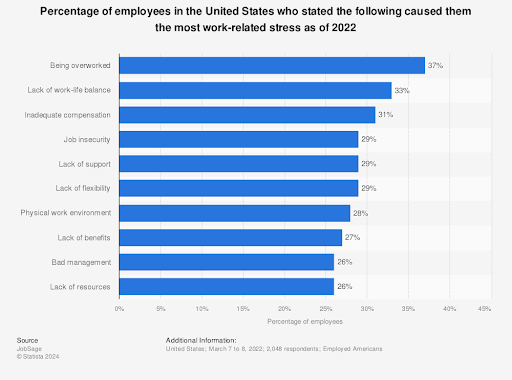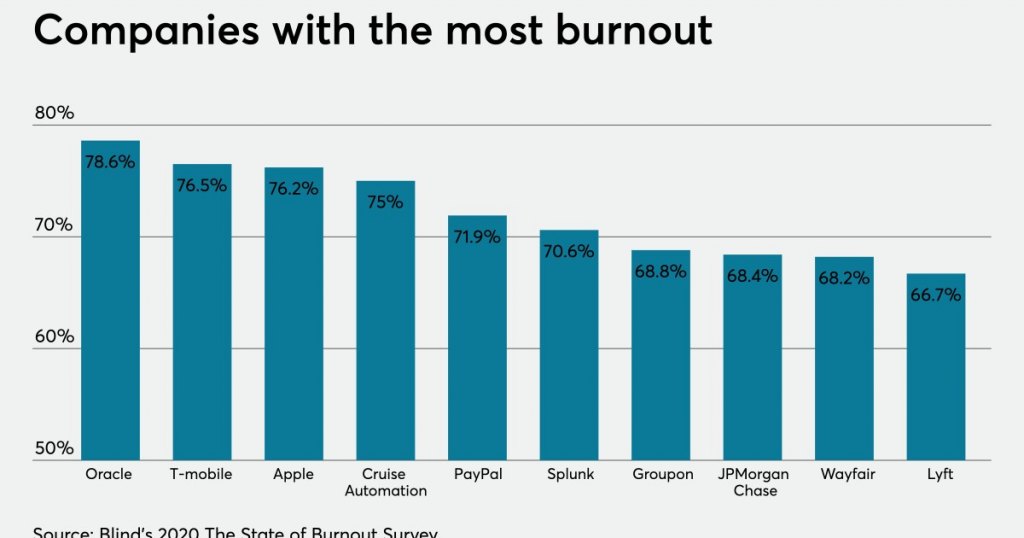Have you ever felt burnout and stress from an excessive workload at your office? If yes, then you are not alone.
Imagine a team that is ambitious, works efficiently and delivers high-quality results consistently without sacrificing their well-being. Imagine another team constantly overwhelmed and stressed, struggling to meet deadlines. Do you know what makes the two teams different? It is effective workload management.
Unrealistic deadlines, regular multitasking, and bad task delegation are examples of bad workload management strategies that disrupt team productivity and overall morale. In this post, we’ll talk about the importance of workload management, some effective strategies, and how poor workload management affects employee well-being.

Strategies to Manage Team Workload
As a manager, you cannot do everything independently, but it doesn’t mean you’ll overburden team members with work. One rule to follow is to allocate specific tasks to team members for just 80% of their time.
A good leader understands each individual’s talents and assigns work that they can perform to the best of their ability, without stressing them out. The following strategies will help you manage your team’s workload and maintain workplace harmony.
Assign Clear Goals & Distribute Workload Fairly
Setting clear goals ensures that each team member understands their priorities and responsibilities. By distributing workload fairly, managers can improve the team’s efficiency, accountability, and job satisfaction. It also reduces burnout and stress among employees.
- Managers should assess individual strengths and workloads to distribute tasks equally, preventing overburdening or underutilization.
- Regular check-ins can adjust workloads as needed and keep projects on track.Implementing recruiting strategies that focus on hiring the right talent also plays a crucial role in maintaining an efficient workload balance.
Set Realistic Deadlines
Unrealistic deadlines can lead to stress, mistakes, and decreased morale. A balanced approach to setting deadlines fosters efficiency without compromising the team’s well-being.
- Managers should collaborate with their teams to establish achievable timeframes based on task complexity and available resources.
- Buffer periods should be built into project timelines to accommodate unforeseen challenges. This way, team members can practice better time management.
Implement Flexible Work Policies
A culture of flexibility enhances job satisfaction, reduces stress, and improves retention, leading to a healthier and more motivated workforce. It allows individuals to work during their most productive hours while accommodating personal commitments.
Flexibility in work arrangements, such as remote work options or flexible hours, helps team members manage their workload effectively.
Promote an Open Door Policy
Encouraging open communication allows employees to voice workload concerns without hesitation. Instead of hesitating, team members should reach out to their managers or team leads if they are overwhelmed by their workload.
- Managers should create an environment where team members feel comfortable discussing challenges, seeking support, and suggesting improvements.
- Regular check-ins and feedback sessions help identify workload imbalances early and enable proactive solutions
Leverage Technology – Use a Project Management & Collaboration Tool
Using a project management and collaboration tools reduce miscommunication, eliminate repetitive efforts, and provide transparency, ensuring managers can equally distribute workload among the team. Using tools like ProofHub helps:
- streamlines workflows
- enhances visibility
- improves communication.
The platform helps teams track tasks, deadlines, and responsibilities in real-time, maintaining team productivity.
Encourage Team Members to Take Breaks
‘All work and no play makes Jack a dull boy.’ The quote is accurate for corporate offices, too, as continuous work without breaks leads to fatigue and decreased productivity.
- Managers should advocate for short, regular breaks and ensure employees take time to recharge.
- Encouraging lunch breaks, walking meetings, or mindfulness activities can improve focus, creativity, and overall well-being, helping team members manage their workload better.
Importance of Workload Management
A study by Deloitte stated that more than 77% of individuals experience burnout at their jobs because of poor workload management. When you underutilize and overburden your team members with work, it reduces their productivity as well as engagement.
Check this graph that shows being overworked is the biggest cause of work-related stress
Effective workload management is essential for sustaining motivation, preventing burnout, and driving long-term team success. Here is why it is important:
- Improves Team Productivity & Work Quality – Balanced workloads help team members focus, boosting efficiency and work output. It enhances creativity and drives better results, improving overall team performance and business success.
- Prevents Employee Burnout & Stress – Fair workload distribution prevents stress and burnout, improving job satisfaction and well-being. A sustainable work pace keeps team members engaged and mentally resilient, reducing turnover and performance issues.
- Encourage Collaboration & Teamwork – With balanced workloads, team members collaborate more effectively. Less pressure on individuals fosters knowledge sharing, innovation, and stronger team dynamics, leading to better problem-solving and effective project management.
- Reduces Absenteeism – Heavy workloads increase absenteeism due to stress and health issues. Managing workloads effectively keeps employees mentally and physically well, ensuring better attendance, team stability, and consistent productivity.
- Boosts Team Morale – Fair workload management enhances engagement and trust in leadership. Team members feel valued and motivated, creating a positive work environment that strengthens morale and drives high performance.
- Better Decision-Making – Excessive workloads lead to rushed, poor decisions. A balanced approach gives team members time to analyze, plan, and assess risks, resulting in smarter choices and better project and business outcomes.
Signs of Workload Overload
Workload overload isn’t always obvious—it often creeps in gradually, impacting performance and morale. If you can spot it early, you can avoid overburdening and maintain team productivity. Look out for the following signs in team members:
- Incomplete work and missing deadlines regularly
- Making errors and silly mistakes
- Normally calm workers showing frustration and stress
- Working overtime more than usual
- Not able to focus properly on tasks
- Not communicating with the team in a proper manner
- Withdrawal from team meetings and ignoring team collaboration
- Increase in leaves and sick days
Workload Management Issues – Impact of Poor Workload Management Strategies
When workload management is poor, productivity suffers, innovation declines, and employee well-being takes a hit, ultimately impacting overall business success.
It does much more damage than just missed deadlines. The following are some issues caused by it and how they impact the well-being of employees.
Increased Burnout & Stress
Excessive workloads create constant pressure, leading to chronic stress and burnout. Team members feel overwhelmed, disengaged, and exhausted, resulting in decreased motivation and productivity.
Over time, this affects retention, as overworked individuals seek healthier work environments elsewhere, increasing turnover rates. The following are the companies where workers feel the most burnout.
Decline in Physical & Mental Health
Prolonged work stress negatively impacts both physical and mental health. Team members may experience fatigue, anxiety, headaches, or even more severe conditions like hypertension and depression.
Poor workload management directly contributes to long-term health issues, reducing overall workforce effectiveness.
Lack of Innovation & Creativity
When the team is constantly overloaded, they have little time or mental capacity for creative thinking. Innovation suffers as individuals focus on survival rather than strategic problem-solving.
A workplace that lacks creativity risks falling behind competitors and missing valuable growth opportunities.
Decline in Employee Engagement
Individuals who feel overwhelmed and unsupported become disengaged, losing interest in their work. They may exhibit lower enthusiasm, reduced collaboration, and decreased productivity.
A lack of engagement leads to lower job satisfaction, increased errors, and a weakened sense of commitment to company goals.
Strained Relationships in the Workplace
Poor workload management creates tension in the workplace. Overburdened team members may become frustrated, leading to conflicts, resentment, and poor communication.
Strained relationships impact teamwork and collaboration, ultimately reducing overall efficiency and damaging workplace culture.
Increased Absenteeism & Sick Leaves
Workload overload leads to stress-related illnesses and burnout, causing team members to take more sick days or mental health breaks.
Frequent absenteeism disrupts workflow, overburdens other team members, and affects overall productivity, creating a cycle of inefficiency and frustration.
Bad Impact on Company Reputation
A company that fails to manage workloads effectively develops a reputation for poor employee well-being. This damages the company’s brand, making it challenging to attract and retain top talent. High turnover, low morale, and negative reviews affect client trust and business success.
Conclusion
Workload management is about creating a thriving workplace where everyone feels valued, engaged, and motivated. When workloads are balanced, teams perform at their best, innovation flourishes, and burnout is minimized.
As a leader, your role is to set the right expectations, provide the necessary resources, and foster a culture that prioritizes well-being alongside performance.
By implementing effective workload management strategies, you not only build a resilient team but also drive long-term business success.

























Leave a comment!